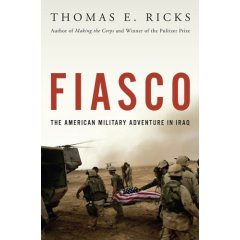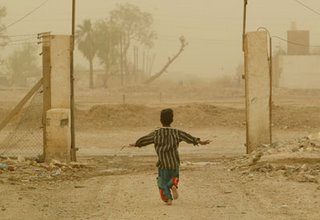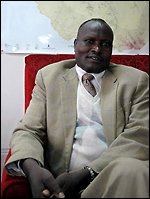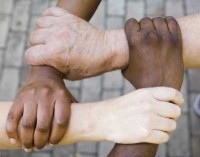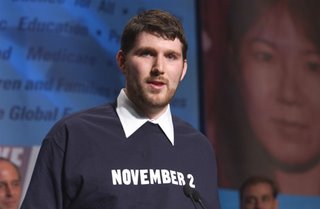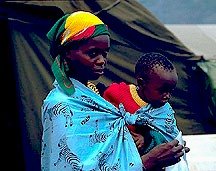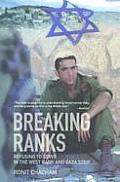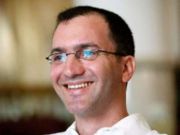I grew up in the sixties and seventies and in my browsing around the net, stumbled upon Der Spiegel's english site (which I check out from time to time), and saw it included images of the WW2. It reminded me of my history class in highschool as we learned everything we had to know from way before WW1, the 1870-71 war between Germany and France, till WW1, the period between the two World Wars and of course, WW2 itself, including the one fought in Asia. We were not spared the atrocious images captured by the Nazi's themselves, but in light of us being teenagers, we were given the option to not watch it if it disturbed us too much. I always felt I had to stay. In fact, growing up, the time leading up to our rememberance day (in May), we'd see a lot of documentaries re. the war, its survivors, the stories, the battles, the (dutch) resistence, the hiding of Jews etc. In that context, it was not as if we were seeing things we hadn't seen before; the piles of amaciated people where Goebels himself looks over to see and then sees someone being alive and a soldier dutifully finishing off the poor subject. In the process of some remains flicking up into Goebel's face to which he leaps off camera to no doubt, throw up. (serves him right) We'd seen the images of Jewish prisoner after prisoner, looking more dead than alive in their bunkbeds, the images of Hitler youth, and always always the message of our history teacher, never again! Never again not just in terms of the attempted eradication of the Jews, but the senseless killings of all people, since we'd have plenty of other examples in history to look at. Our history teacher showed us plenty of times, the Dutch complicity in history's events. Dutch traitors during WW2, Dutch merchants shipping off slaves for North America, the Dutch 'Christian' arrogant attitude when dealing with the East Indian people and the lands and people we subjugated in the quest for trade and trade relations. In that light, I want to address KT, where he asked me politely (coming from him, it is not a way to call names to shut me up) if I am anti American. KT, I grew up with a lot of criticism leveled at our own people and gov'ts throughout our history. The Dutch had glory times, but human nature and the ignorance of its times also gave us plenty of examples how fallable 'man' is, and how one has to have the courage to face their own checquered past (sp?). My history teachers in highschool always put our history into context and never made us feel that we were or are superior, because of the flipside that is always present, or can be present. It is a matter of vigilance. You can love your country, but hate what is going on. I can seem anti American, but that doesn't mean I hate this country. Anti-americanism in my mind seems a typical American term that subconsciously says, you're either for us or against us. I know this is not your frame of reference so I respect your observation. I am frustrated to pieces (to say it politely) with the way politics, most of all federal, is being corrupted. The US does enjoy a wonderful civic society and as such, still provides plenty of opportunities to speak up and rally against. However, I do think that in terms of effectiveness, it is mostly symbolic, and not influential. The explosion of the blogosphere tells me, that people want to communicate, not just regurgitate, and want to discuss. I grew up with family gatherings, birthday gatherings as a kid where the adults (relatives and friends) would have serious discussions and serious disagreements (!!) on all kinds of political (domestic and foreign) issues, social and economic affairs. They agreed to disagree and they still had friendly relations. They still kept talking. It is a given, that those who come to my site, will mostly agree with me. I wish I could gather a group, a la my relatives, who could agree to disagree and who would always continue discussing, issues of importance. Not pop culture, not the latest on stupid little baby Suri (sorry little girl), or, don't make me heave Ann Coulter. I vent part of the time, but I really do want to have peopel meet in the middle, a place where they can agree without having to agree with everything. I am frustrated, and I am trying to get it out of my system by trying to do something productive. Hopefully my time at KOOP radio will faciliate that. As one letter writer to the Austin American Statesman said;, it's nice that people feel strongly about this war (talking about the current ME conflict), but perhaps these same people could actually try to do something like writing to their Senator, Representative or something else. So if I do sound 'anti-American' and just seem to spout my views, I will say this; I will try to put my money where my mouth is and do something. But being and thinking critical is part of my Dutch heritage. Nothing personal though.
PS, here is an excerpt (and example of the ability to look at one's own history critically) of
Der Spiegel's 'images of World War 2':
Many soldiers also kept cameras in their field packs and managed to snap explosive amateur photos. Though the Nazi regime conducted almost absolute surveillance, it encouraged its soldiers to take photos as a way of strengthening the connection between the soldiers' homes and the front to improve morale. The Nazis couldn't control all the photography, anyway.
Most of the amateur photographers chose innocuous subjects for their snapshots -- other soldiers in their unit, landscapes, memorials and even people in the areas they occupied. The photos taken by these armed tourists often made it look like their work had all the severity of a school field trip.
Nevertheless, many of snap shooters felt a sort of magical draw to the horrors of the war of extermination in the Soviet Union. Many captured the mass shootings of Jews or the hanging of members of the resistance on film -- pictures that were strictly forbidden by Heinrich Himmler, the head of the SS.
Many such horror photos were taken out of the pockets of dead or captured German fighters by Red Army soldiers. The photos then became evidence in the trials against German war criminals in the Soviet Union and later in the legal processing of the Nazi criminals in Germany.
The same went for the photographic evidence of the Holocaust, and especially for the photos take by Allied troops after the liberation of the concentration camps. The argument that quickly developed over whether or not these photos -- some of the 20th century's most shocking and difficult to bear -- should be shown, has continued until today. Do the photos of the emaciated prisoners lead to a kind of emotional blunting? Do the pictures of the mountains of corpses dishonor the victims anew? Or do they serve the purpose of education?
But discussions, there are.
